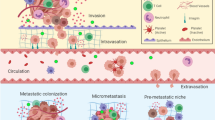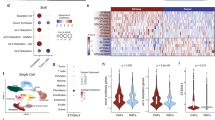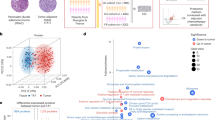Abstract
MUC4 is a large transmembrane type I glycoprotein that is overexpressed in pancreatic cancer (PC) and has been shown to be associated with its progression and metastasis. However, the exact cellular and molecular mechanism(s) through which MUC4 promotes metastasis of PC cells has been sparsely studied. Here we showed that the nidogen-like (NIDO) domain of MUC4, which is similar to the G1-domain present in the nidogen or entactin (an extracellular matrix protein), contributes to the protein–protein interaction property of MUC4. By this interaction, MUC4 promotes breaching of basement membrane (BM) integrity, and spreading of cancer cells. These observations are corroborated with the data from our study using an engineered MUC4 protein without the NIDO domain, which was ectopically expressed in the MiaPaCa PC cells, lacking endogenous MUC4 and nidogen protein. The in vitro studies demonstrated an enhanced invasiveness of MiaPaCa cells expressing MUC4 (MiaPaCa–MUC4) compared with vector-transfected cells (MiaPaCa–Vec; P=0.003) or cells expressing MUC4 without the NIDO domain (MiaPaCa–MUC4–NIDOΔ; P=0.03). However, the absence of NIDO-domain has no significant role on cell growth and motility (P=0.93). In the in vivo studies, all the mice orthotopically implanted with MiPaCa-MUC4 cells developed metastasis to the liver as compared with MiaPaCa–Vec or the MiaPaCa–MUC4–NIDOΔ group, hence, supporting our in vitro observations. Additionally, a reduced binding (P=0.0004) of MiaPaCa–MUC4–NIDOΔ cells to the fibulin-2 coated plates compared with MiaPaCa–MUC4 cells indicated a possible interaction between the MUC4–NIDO domain and fibulin-2, a nidogen-interacting protein. Furthermore, in PC tissue samples, MUC4 colocalized with the fibulin-2 present in the BM. Altogether, our findings demonstrate that the MUC4–NIDO domain significantly contributes to the MUC4-mediated metastasis of PC cells. This may be partly due to the interaction between the MUC4–NIDO domain and fibulin-2.
This is a preview of subscription content, access via your institution
Access options
Subscribe to this journal
Receive 50 print issues and online access
$259.00 per year
only $5.18 per issue
Buy this article
- Purchase on Springer Link
- Instant access to full article PDF
Prices may be subject to local taxes which are calculated during checkout






Similar content being viewed by others
References
Aumailley M, Battaglia C, Mayer U, Reinhardt D, Nischt R, Timpl R et al. (1993). Nidogen mediates the formation of ternary complexes of basement membrane components. Kidney Int 43: 7–12.
Bacac M, Stamenkovic I . (2008). Metastatic cancer cell. Annu Rev Pathol 3: 221–247.
Casey RC, Skubitz AP . (2000). CD44 and beta1 integrins mediate ovarian carcinoma cell migration toward extracellular matrix proteins. Clin Exp Metastasis 18: 67–75.
Chaturvedi P, Singh AP, Batra SK . (2008a). Structure, evolution, and biology of the MUC4 mucin. FASEB J 22: 966–981.
Chaturvedi P, Singh AP, Chakraborty S, Chauhan SC, Bafna S, Meza JL et al. (2008b). MUC4 mucin interacts with and stabilizes the HER2 oncoprotein in human pancreatic cancer cells. Cancer Res 68: 2065–2070.
Chaturvedi P, Singh AP, Moniaux N, Senapati S, Chakraborty S, Meza JL et al. (2007a). MUC4 mucin potentiates pancreatic tumor cell proliferation, survival, and invasive properties and interferes with its interaction to extracellular matrix proteins. Mol Cancer Res 5: 309–320.
Chaturvedi P, Singh AP, Moniaux N, Senapati S, Chakraborty S, Meza JL et al. (2007b). MUC4 mucin potentiates pancreatic tumor cell proliferation, survival, and invasive properties and interferes with its interaction to extracellular matrix proteins. Mol Cancer Res 5: 309–320.
DiMagno EP, Reber HA, Tempero MA . (1999). AGA technical review on the epidemiology, diagnosis, and treatment of pancreatic ductal adenocarcinoma American Gastroenterological Association. Gastroenterology 117: 1464–1484.
Duraisamy S, Ramasamy S, Kharbanda S, Kufe D . (2006). Distinct evolution of the human carcinoma-associated transmembrane mucins, MUC1, MUC4 AND MUC16. Gene 373: 28–34.
Fox JW, Mayer U, Nischt R, Aumailley M, Reinhardt D, Wiedemann H et al. (1991). Recombinant nidogen consists of three globular domains and mediates binding of laminin to collagen type IV. EMBO J 10: 3137–3146.
Hotary K, Li XY, Allen E, Stevens SL, Weiss SJ . (2006). A cancer cell metalloprotease triad regulates the basement membrane transmigration program. Genes Dev 20: 2673–2686.
Jemal A, Siegel R, Xu J, Ward E . (2010). Cancer statistics, 2010. CA Cancer J Clin 60: 277–300.
Karnoub AE, Dash AB, Vo AP, Sullivan A, Brooks MW, Bell GW et al. (2007). Mesenchymal stem cells within tumour stroma promote breast cancer metastasis. Nature 449: 557–563.
Komatsu M, Tatum L, Altman NH, Carothers Carraway CA, Carraway KL . (2000). Potentiation of metastasis by cell surface sialomucin complex (rat MUC4), a multifunctional anti-adhesive glycoprotein. Int J Cancer 87: 480–486.
Langley RR, Fidler IJ . (2007). Tumor cell-organ microenvironment interactions in the pathogenesis of cancer metastasis. Endocr Rev 28: 297–321.
Li D, Xie K, Wolff R, Abbruzzese JL . (2004). Pancreatic cancer. Lancet 363: 1049–1057.
Ma C, Rong Y, Radiloff DR, Datto MB, Centeno B, Bao S et al. (2008). Extracellular matrix protein betaig-h3/TGFBI promotes metastasis of colon cancer by enhancing cell extravasation. Genes Dev 22: 308–321.
Ma C, Wang XF . (2008). In vitro assays for the extracellular matrix protein-regulated extravasation process. Cold Spring Harb Protoc 2008: 5034–5036.
Moniaux N, Chaturvedi P, Varshney GC, Meza JL, Rodriguez-Sierra JF, Aubert JP et al. (2007). Human MUC4 mucin induces ultra-structural changes and tumorigenicity in pancreatic cancer cells. Br J Cancer 97: 345–357.
Nguyen DX, Bos PD, Massague J . (2009). Metastasis: from dissemination to organ-specific colonization. Nat Rev Cancer 9: 274–284.
Piscaglia F, Dudas J, Knittel T, Di RP, Kobold D, Saile B et al. (2009). Expression of ECM proteins fibulin-1 and -2 in acute and chronic liver disease and in cultured rat liver cells. Cell Tissue Res 337: 449–462.
Ponnusamy MP, Lakshmanan I, Jain M, Das S, Chakraborty S, Dey P et al. (2010). MUC4 mucin-induced epithelial to mesenchymal transition: a novel mechanism for metastasis of human ovarian cancer cells. Oncogene 29: 5741–5754.
Ries A, Gohring W, Fox JW, Timpl R, Sasaki T . (2001). Recombinant domains of mouse nidogen-1 and their binding to basement membrane proteins and monoclonal antibodies. Eur J Biochem 268: 5119–5128.
Rowe RG, Weiss SJ. . (2008). Breaching the basement membrane: who, when and how? Trends Cell Biol 18: 560–574.
Senapati S, Chaturvedi P, Sharma P, Venkatraman G, Meza JL, El-Rifai W et al. (2008). Deregulation of MUC4 in gastric adenocarcinoma: potential pathobiological implication in poorly differentiated non-signet ring cell type gastric cancer. Br J Cancer 99: 949–956.
Senapati S, Das S, Batra SK . (2010). Mucin-interacting proteins: from function to therapeutics. Trends Biochem Sci 35: 236–245.
Singh AP, Chaturvedi P, Batra SK . (2007a). Emerging roles of MUC4 in cancer: a novel target for diagnosis and therapy. Cancer Res 67: 433–436.
Singh AP, Chauhan SC, Andrianifahanana M, Moniaux N, Meza JL, Copin MC et al. (2007b). MUC4 expression is regulated by cystic fibrosis transmembrane conductance regulator in pancreatic adenocarcinoma cells via transcriptional and post-translational mechanisms. Oncogene 26: 30–41.
Singh AP, Moniaux N, Chauhan SC, Meza JL, Batra SK . (2004). Inhibition of MUC4 expression suppresses pancreatic tumor cell growth and metastasis. Cancer Res 64: 622–630.
Ulazzi L, Sabbioni S, Miotto E, Veronese A, Angusti A, Gafà R et al. (2011). Nidogen 1 and 2 gene promoters are aberrantly methylated in human gastrointestinal cancer. Mol Cancer 6: 17.
Yi CH, Smith DJ, West WW, Hollingsworth MA . (2007). Loss of fibulin-2 expression is associated with breast cancer progression. Am J Pathol 170: 1535–1545.
Acknowledgements
This work was supported by the grants from National Institutes of Health (CA78590, CA111294, CA127297, CA133774 and CA131944). We thank Ms Kristi L Berger for editing the manuscript. We acknowledge the invaluable technical support from Mr Erik Moore and Kavita Mallya. We also thank Janice A Tayor and James R Talaska of the confocal laser scanning microscope core facility at the UNMC, for their support.
Author information
Authors and Affiliations
Corresponding author
Ethics declarations
Competing interests
The authors declare no conflict of interest.
Additional information
Supplementary Information accompanies the paper on the Oncogene website
Rights and permissions
About this article
Cite this article
Senapati, S., Gnanapragassam, V., Moniaux, N. et al. Role of MUC4–NIDO domain in the MUC4-mediated metastasis of pancreatic cancer cells. Oncogene 31, 3346–3356 (2012). https://doi.org/10.1038/onc.2011.505
Received:
Accepted:
Published:
Issue Date:
DOI: https://doi.org/10.1038/onc.2011.505
Keywords
This article is cited by
-
Lymph Node Dissection in Upper Tract Urothelial Carcinoma: Current Status and Future Perspectives
Current Oncology Reports (2023)
-
Unraveling mucin domains in cancer and metastasis: when protectors become predators
Cancer and Metastasis Reviews (2020)
-
The expression level of fibulin-2 in the circulating RNA (ctRNA) of epithelial tumor cells of peripheral blood and tumor tissue of patients with metastatic lung cancer
Molecular Biology Reports (2019)
-
Mucin glycoproteins block apoptosis; promote invasion, proliferation, and migration; and cause chemoresistance through diverse pathways in epithelial cancers
Cancer and Metastasis Reviews (2019)
-
Fibulin-2 is required for basement membrane integrity of mammary epithelium
Scientific Reports (2018)



